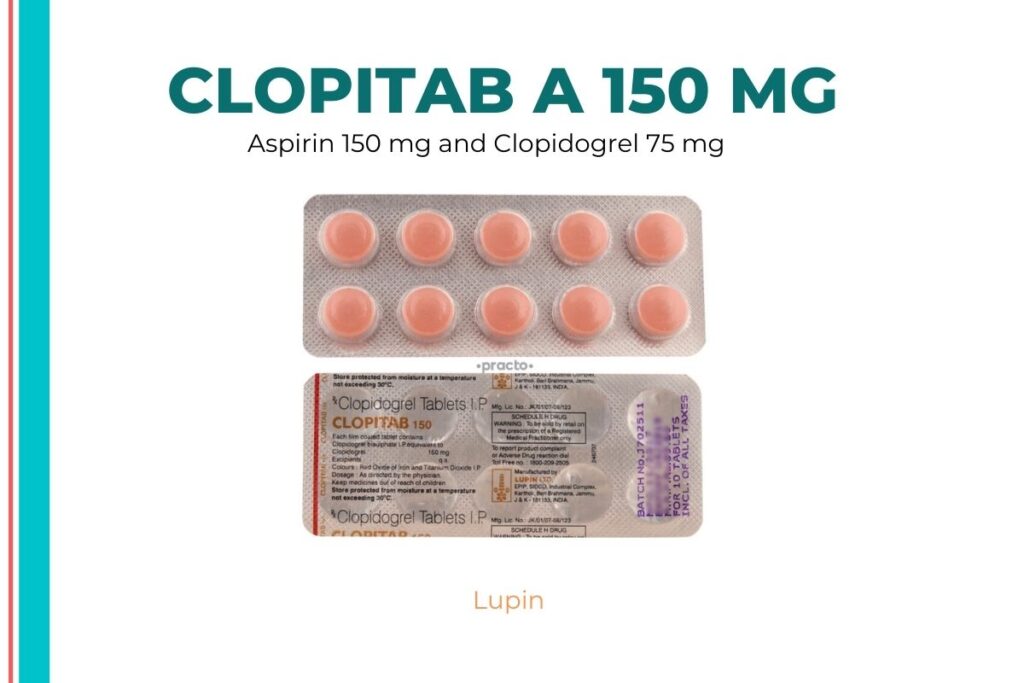Clopitab A 150
Clopitab A 150 belongs to the antiplatelet medication class that is used to prevent heart attacks and strokes. When a blood clot stops blood flow to the heart, a heart attack ensues. The accumulation of fat, cholesterol, and other chemicals, which create a plaque in the arteries that feed the heart, is the most common cause of artery obstruction (coronary arteries). Chest discomfort, upper body pain, perspiration, nausea, exhaustion, and problems breathing are all signs of a heart attack.
Clopitab A 150 is made up of two different medications: aspirin and clopidogrel. Anti-platelet agents are blood thinners that prevent blood clots from forming in the arteries. In a low dose (around 75 mg), aspirin acts as a blood thinner or anti-platelet drug to prevent heart attack and stroke. If you have severe chest discomfort (unstable angina or a heart attack), stroke, or peripheral artery disease, clopidogrel works by preventing blood clots (heart problem due to narrowed blood vessels). Clopitab A 150 promotes blood flow, which helps to prevent heart attacks, strokes, deep vein thrombosis (blood clots in veins), and pulmonary embolism (blood clots in the arteries of lungs).
Clopitab A 150 is a medication that is taken by mouth. With a glass of water, swallow the tablet whole. It should not be chewed, bit, or broken. Based on your medical condition, your doctor will tell you how often you should take your medications. Abdominal pain, indigestion, diarrhea, bruises, and nosebleeds are all frequent adverse effects of Clopitab A 150. Driving should be avoided when using Clopitab A 150 because it is known to produce dizziness and blurred vision. The majority of Clopitab A 150’s adverse effects do not require medical treatment and fade away with time. However, if the negative effects do not go away, consult your doctor.
Make an effort not to quit taking your own meds. Stopping Clopitab A 150 could make your health worse and put you at risk for another heart attack. If you are allergic to clopidogrel or aspirin, have kidney or liver disease, bleeding problems (such as peptic ulcers or brain hemorrhage), are pregnant or planning to become pregnant, or are breastfeeding, tell your doctor. Before any surgery or taking any new prescription, the patient should inform their doctor that they are taking Clopitab A 150.
Clopitab A 150 uses include preventing heart attacks and strokes.

Medicinal Advantages
Clopitab A 150 is made up of the anti-platelet drugs aspirin and clopidogrel, which work together to prevent blood clots in the arteries. In a low dose (around 75 mg), aspirin acts as a blood thinner or anti-platelet drug to prevent heart attack and stroke. If you have severe chest discomfort (unstable angina or a heart attack), stroke, or peripheral artery disease, clopidogrel works by preventing blood clots (heart problem due to narrowed blood vessels). Clopitab A 150 promotes blood flow, which helps to prevent heart attacks, strokes, deep vein thrombosis (blood clots in veins), and pulmonary embolism (blood clots in the arteries of lungs).
Use Instructions
Clopitab A 150 is a medication that is taken by mouth. With a glass of water, swallow the tablet whole. It should not be chewed, bit, or broken. Based on your medical condition, your doctor will tell you how often you should take your medications. To get the most out of Clopitab A 150, take it as directed by your doctor, ideally with a meal, and combine it with healthy lifestyle behaviors (such as eating well and being active). Even if you are feeling well, do not stop taking your medicine unless your doctor has instructed you to.
Store in a cool, dry location away from direct sunlight.
Clopitab A 150 Side Effects
Abdominal pain, indigestion, diarrhoea, bruises, nosebleeds, and increased bleeding tendency are all common adverse effects of Clopitab A 150. Although not all of these adverse effects are likely to occur, if they do, get medical help right once.
Drug Recommendations
If you are allergic to clopidogrel, aspirin, salicylates, or anti-inflammatories, you should not take Clopitab A 150. (pain killers). If you have a medical condition that causes bleeding, such as hemophilia, a stomach ulcer, or bleeding in your head or gut, tell your doctor. Patients with liver or kidney disorders should use Clopitab A 150 with caution. Before taking Clopitab A 150, anyone with respiratory disorders such as asthma, rhinitis, or nasal polyps should visit a doctor. Clopitab A 150 should not be used by a breastfeeding woman because it goes into her milk. Clopitab A 150 should not be administered to children under the age of 12 because its safety and effectiveness have not been proved.
Interactions Between Drugs
Blood thinners (warfarin, heparin, phenindione, ticlopidine), anti-psychotics (fluoxetine, fluvoxamine, moclobemide, lithium, sertraline, paroxetine), anti-diabetics (glipalamide, repaglinide), anti-cancer drugs (paclitaxel, methotrexate), gout medications (probenecid), anti-epilepsy drugs (valproate, pheny (efavirenz, ritonavir, cobicistat).
Limit alcohol consumption since it can induce a rise in blood pressure, which can contribute to heart disease. Control your cholesterol and triglyceride levels by avoiding fatty foods.
Before taking Aspirin and Clopidogrel, tell your doctor if you have a medical history of allergic reactions to drugs, heart illness, active bleeding disorders, asthma, a clot in a brain artery (ischemic stroke), liver, or kidney disease.
Safety Suggestions
ALCOHOL
Alcohol consumption is dangerous because it might exacerbate adverse effects such as dizziness and raise blood pressure.
PREGNANCY
Because it affects the unborn, aspirin and clopidogrel should not be used during pregnancy. If you are planning to become pregnant or are already pregnant, talk to your doctor before starting aspirin and clopidogrel.
BREAST FEEDING
The effects of aspirin and clopidogrel on breastfeeding are unknown. If you are lactating, however, you should avoid taking aspirin or clopidogrel since they pass through the breast milk and harm the baby. Before taking aspirin and clopidogrel, talk to your doctor.
DRIVING
If you are dizzy or drowsy while taking aspirin or Clopidogrel, don’t drive or use machinery. Aspirin and Clopidogrel can both induce blurry vision, so don’t drive if you’re taking them. If the symptoms don’t go away after a few days, see a doctor.
LIVER
If you have a history of liver illness or hepatic impairment, tell your doctor. Before prescribing Aspirin with Clopidogrel, your doctor will balance the benefits and risks. It is not, however, suggested for those with severe liver disease.
KIDNEY
If you have a history of kidney problems, tell your doctor. Before prescribing Aspirin with Clopidogrel, your doctor will balance the benefits and risks. It is not, however, suggested for those with advanced kidney disease.
No habit formation
Advice on Diet and Lifestyle
Follow the doctor’s instructions and take the medication at regular intervals. When taking Aspirin with Clopidogrel, do not use any additional over-the-counter drugs, herbal supplements, or vitamin supplements without first consulting your pharmacist or doctor.
Maintain a healthy cholesterol and triglyceride level.
Eat at regular intervals and eat a balanced meal rich in fresh fruits and vegetables.
Alcohol use should be limited since it elevates blood pressure and increases the risk of heart disease.
To keep your heart healthy, keep track of your weight and exercise regularly.
Your doctor will also teach you how to recognize and manage the early signs of heart disease.
Additional Information : This item is non-refundable.
Concerns of Patients
A blood clot is a clump or aggregation of blood that changes its condition from liquid to gel-like. Clotting is a natural mechanism that prevents excessive blood loss in the event of an accident, trauma, surgery, or a cut. A clot that forms inside the veins does not always dissolve on its own, and it can become a life-threatening situation.
Stroke: When our brain does not receive enough oxygen and blood, it begins to die within minutes, resulting in a heart attack or stroke.
A blood clot stops blood flow to the heart, resulting in a heart attack. The accumulation of fat, cholesterol, and other chemicals, which create a plaque in the arteries that feed the heart, is the most common cause of artery obstruction (coronary arteries). The blood flow that supplies the heart with oxygen is cut off during a heart attack (myocardial infarction). The cardiac muscle dies as a result of this. Chest discomfort, upper body pain, perspiration, nausea, exhaustion, and problems breathing are all signs of a heart attack.
FAQs
Aspirin plus Clopidogrel make up Clopitab A 150. These are blood thinners that can make you more prone to bleeding. It is recommended that you use caution when shaving, cutting your fingernails, or using sharp tools in your usual activities. Also, before undergoing any procedure, please visit your doctor.
Please see your doctor if you need to stop taking aspirin or clopidogrel before surgery. The doctor may advise you to stop taking aspirin and clopidogrel a few days prior to surgery since they can raise the risk of bleeding.
One of the negative effects of aspirin with clopidogrel is dizziness. If you feel dizzy for an extended period of time, please see your doctor.
Because it affects the unborn, aspirin and clopidogrel should not be used during pregnancy. If you are planning to become pregnant or are already pregnant, talk to your doctor before starting aspirin and clopidogrel.
The effects of aspirin and clopidogrel on breastfeeding are unknown. If you are lactating, however, you should avoid taking aspirin or clopidogrel since they pass through the breast milk and harm the baby. Before taking aspirin and clopidogrel, talk to your doctor.
Alcohol consumption is dangerous because it might exacerbate adverse effects such as dizziness and raise blood pressure.
Long-term use of aspirin with clopidogrel is generally safe. It is most effective when taken for several months or even years. If you’re at danger of developing a stomach ulcer while taking aspirin and clopidogrel, your doctor may prescribe a stomach ulcer treatment.
If you miss a dosage, take it as soon as possible. If your next dose is approaching, skip the missed dose and return to your regular dosing plan.
If you are dizzy or drowsy while taking aspirin or Clopidogrel, don’t drive or use machinery. Aspirin and Clopidogrel can both induce blurry vision, so don’t drive if you’re taking them. If the symptoms don’t go away after a few days, see a doctor.








Leave a Reply
You must be logged in to post a comment.